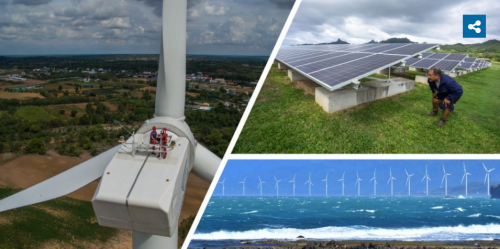
Your Excellencies. Ladies and Gentlemen,
It is an honor to speak to you today at this important summit on the clean energy transition toward sustainable recovery.
First, let me thank Dr. Birol for his contribution to ADB’s Asia Clean Energy Forum several weeks ago. It was the 15th anniversary of our premier regional event promoting the clean energy transition. ADB has valued IEA’s strong support and partnership on this agenda over the years.
Like other parts of the world, the impact of the coronavirus disease (COVID-19) pandemic on Asia and the Pacific is very serious. ADB’s Asian Development Outlook supplement, published in June, projects that 33 out of 45 of ADB’s developing member countries will contract this year. Overall, developing Asia expects to grow marginally by 0.1% in 2020, the slowest growth for the region since 1961.
ADB has responded rapidly to tackle the immediate impact of the pandemic, announcing a $20 billion comprehensive support package. We have already committed $7 billion of this amount. In addition, in the energy sector, we have committed about $500 million in loans so far this year to support renewable energy, energy efficiency, and electricity networks.
The energy sector is playing a vital role during the COVID-19 crisis, providing an uninterrupted power supply to hospitals, and enabling millions of people to work or study from home. Recovery from the pandemic is also providing opportunities for countries to chart a path that aligns even more strongly with the goals of sustainable development and addresses climate change.
Increased investments now in renewable energy, energy efficiency, and smart grids can create more high quality and long-term jobs, and reduce air pollution and greenhouse gas emissions. Economies will become more resilient to future shocks—because renewable energy with energy storage does not depend on fuel supplies, and smart grid systems can be brought back online rapidly after an event. Renewable energy can also help strengthen health facilities, particularly in rural areas—for example, solar based cold chains will be essential to make vaccines available.
In 2019, our climate financing reached a record high of $6.56 billion, meeting our target of doubling ADB’s annual climate investments from 2014, a year ahead of schedule. We have set an even higher climate target for the next ten years under our Strategy 2030. We aim by 2030 to provide $80 billion in cumulative climate financing and to focus on climate adaptation and mitigation efforts in at least 75% of our operations.
Building economic recovery and achieving sustainable energy goals both globally and in Asia and the Pacific require closer cooperation among all stakeholders. And of course, this effort includes our renewed relationship with the IEA, where there is a great synergy between IEA’s analytical capabilities and ADB’s on-the-ground operations in Asia and the Pacific. ADB and the IEA have just signed a new MOU to continue our cooperation, with focus on new energy technologies and energy sector resilience.
Let me conclude by saying that, at this important juncture of history, we can address the huge challenges in front of us if we partner together to support a low carbon transition for sustainable recovery.
ADB is committed to this very important work, and we look forward to working with all those joining us today at this summit.
Thank you.
ADB, IEA Renew Agreement to Collaborate on Energy Sector Sustainability and Resilience
MANILA, PHILIPPINES (9 July 2020) — The Asian Development Bank (ADB) has renewed a memorandum of understanding (MOU) with the International Energy Agency (IEA) to scale up collaboration and advance progress on sustainability with increased focus on energy sector resilience in Asia and the Pacific.
“The energy sector is a key driver of growth and human development, especially during recovery from the impacts of the coronavirus disease (COVID-19) pandemic,” said ADB President Masatsugu Asakawa. “We are pleased to renew our agreement with IEA, which builds on our successful collaboration to date, and we look forward to advancing our shared objective of achieving a more sustainable and resilient energy future in Asia and the Pacific.”
Under the 3-year agreement, the two organizations will share knowledge and best practice in energy sector data and analysis, on-the-ground engagement, capacity building, technology, and innovation, among other areas. This will help to overcome critical knowledge and experience gaps blocking the development of sustainable energy systems in ADB's developing member countries and enhance IEA’s data collection and capacity building efforts in Asia and the Pacific.
ADB first signed a 3-year MOU with IEA in March 2017 to facilitate knowledge and analytical work to advance clean energy development in ADB’s developing member countries. As part of this, ADB worked with IEA to study power system flexibility in India to integrate more solar and wind energy in the grids.
The renewal agreement was signed on the occasion of IEA’s Clean Energy Transitions Summit, where Mr. Asakawa gave a speech at the plenary session to an audience of over 50 energy ministers and energy sector leaders. Last month, IEA Executive Director Fatih Birol delivered the keynote address at ADB’s 15th Asia Clean Energy Forum 2020. IEA is a knowledge partner of ADB’s leading annual energy forum.
ADB invested more than $23 billion in clean energy, including both sovereign and nonsovereign initiatives from 2008 to 2019. Last year, ADB’s climate financing reached a record $6.56 billion, meeting its target of doubling its annual climate investments from 2014 one year ahead of schedule.
Under Strategy 2030, ADB is targeting $80 billion in cumulative climate financing from its own resources by 2030 and for at least 75% of its country operations to feature climate adaptation and mitigation initiatives.
ADB is committed to achieving a prosperous, inclusive, resilient, and sustainable Asia and the Pacific, while sustaining its efforts to eradicate extreme poverty. Established in 1966, it is owned by 68 members—49 from the region.










Add new comment